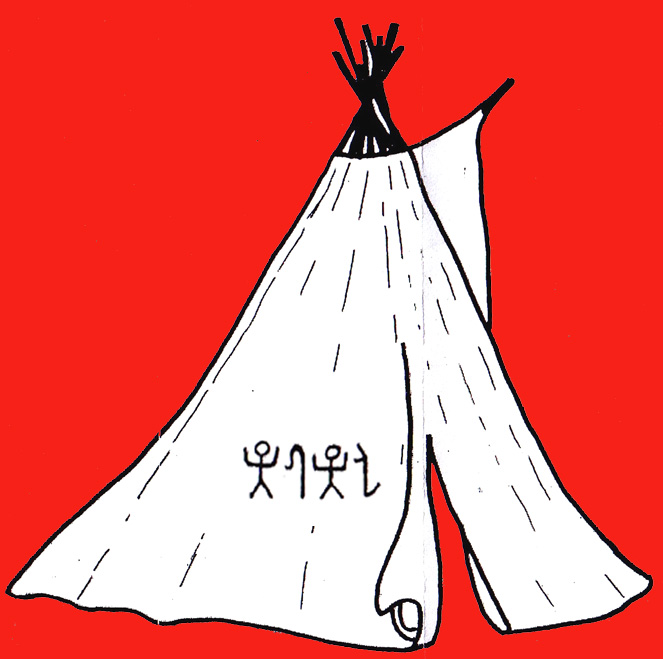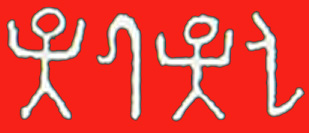
Hebrew Writings found in
Pittsfield Mass. 1815

 |
Hebrew Writings found in Pittsfield Mass. 1815 |
 |
|
The following information is given by Ethan Smith a pastor from Poultney Vermont in his book View of the Hebrews, now back in print thanks to the folks who publish the Ancient American magazine. The book is available through this ministry for $17.00 227pgs. Ethan Smith argues in favor of the American Indians as the lost tribes of Israel, a widely held view prior to 1843. "The late Dr. Boudinot stated to Dr. Griffin that S. Larned (who died in New Orleans) informed him that while he was living in Pittsfield, Mass. - his native place - after he left college, there was dug up in Pittsfield by one of his neighbors, probably from an Indian grave, some written parchments enclosed in a cover of skins. These parchments he obtained, took them to Boston, had them read, and found them to be the same with the parchments used in Jewish phylacteries, and well written in Hebrew. Mr. Larned added that he left them with Dr. Elliot of Boston. Dr. Boudinot obtained leave of Mr. Larned to send and take them. He sent; but for some reason could not obtain them. Dr. Elliot soon after died; and nothing more was done upon the subject. On receiving this information from Dr. Griffin, the writer (Ethan Smith) wrote to Dr. Humphrey, then minister of Pittsfield, requesting him to see what further information might be there obtained relative to this matter. He returned an answer. It was just as Mr. Humphrey was about leaving his people for the Presidency of the Amherst Collegiate Institution; and he could not pay much attention to the subject. He made considerable inquiry, however; but without much success. But he informed that he had a distinct recollection, that when he came to Pittsfield, not long after the said parchments were found, he heard considerable said upon this subject. And he found an impression on his mind that it was then said that some Jew probably lost these parchments there. The author wrote also to J. Everts, of Boston, desiring him to see if the parchments could be found. An answer was returned, that they were in the hands of the Antiquarian Society. He stated also, the same account with that of Mr. Humphrey, that they were supposed to have been left in Pittsfield by some Jew. .. . The public mind had thus been laid to rest relative to the parchments. The writer concluded to pay no further attention to the subject. But being advised by one whom he highly respected, and who apprehended there might be something about this, not yet investigated, he took a journey to Pittsfield. With some of the first characters of that town he took pains to ascertain whether any Jew was ever known to have resided or been in Pittsfield? Inquiry was made of different aged people, and who it was thought would be likely to give the most correct information -one or two who had been there from within several years of the first settlement of the place. One and all answered in the negative, that no Jew was ever known in Pittsfield, as they believed, till Mr. Frey was there a few weeks before. The man was then found who first discovered the parchments under consideration. This was Joseph Merrick, Esq. highly respectable character in the church of Pittsfield, and in the county, as the minister of the place informed. Mr. Merrick gave the following account; That in 1815, he was leveling some ground under and near an old wood shed standing on a place of his situated on Indian Hill, (a place in Pittsfield so called, and lying, as the writer was afterward informed, at some distance from the middle of the town where Mr. Merrick is now living.) He ploughed and conveyed away old chips and earth, to some depth, as the surface of the earth appeared uneven. After the work was done, walking over the place, he discovered, near where the earth had been dug the deepest, a kind of black strap, about six inches in length, and one and a half in breadth, and something thicker than a draw leather of a harness. He perceived it had at each end a loop of some hard substance, probably for the purpose of carrying it. He conveyed it into his house, and threw it in an old tool box. He afterward found it thrown out of doors, and again conveyed it to the box. After some time he thought he would examine it. He attempted to cut it, and found it hard as a bone. He succeeded in cutting it open, and found it was formed with pieces of thick raw hide, sewed and made water tight with the sinews of some animal; and in the fold it contained four folded leaves of old parchment. These leaves were of a dark yellow, and contained some kind of writing. Some of the neighbors saw and examined them. One of these parchments they tore in pieces; the other three he saved, and delivered them to Mr. Sylvester Larned, graduate then in town, who took them to Cambridge, and had them examined. They were written in Hebrew with a pen, in plain and intelligible writing. The following is an extract of a letter sent to Mr. Merrick by Mr. Larned, upon this subject. "Sir; I have examined the parchment manuscripts, which you had the goodness to give me. After some time and with much difficulty and assistance I have ascertained their meaning, which is as follows (I have numbered the manuscripts). No. 1 is translated by Deut. vi. 4-9 verses inclusive. No.2, by Deut. xi. 13-21 verses inclusive. No. 3, Exod. xiii. 11-16 verses inclusive. I am, &c. SYLVESTER LARNED. The celebrated Calmet informs that the above are the very texts of Scripture which the Jews used to write in three out of four of their leaves of phylacteries; from which it is presumable that the fourth leaf, torn in pieces, contained the texts which belonged to the forth leaf. The leaves of their phylacteries were ever four. Calmet, on the article Phylactery, says; 'This word from the Greek signifies a preservative. Mr. Merrick informed that a Dr. James was living in Pittsfield when these parchments were found, and felt much interest in the event. He soon moved into NY. He afterward informed Mr. Merrick, that he had laid this matter before an aged Jew, who also felt interested in the event; and who, after considering the subject some time, concluded that he could give no account of the leaves being found in such a condition in Pittsfield from any custom of the Jews. . . . Mr. Merrick assured me, he had ever believed it to have been of Indian origin; and that Col. Larned (father of the late Mr. Larned) lived and died in the same belief. It seems no evidence has appeared to the contrary; notwithstanding the aforementioned groundless conjecture, which when it got abroad was magnified into a satisfactory account. The writer (Ethan Smith) left Pittsfield for Boston with a view to obtain these parchments, . . . In Boston Mr. Jenks informed him the parchments were at Worcester, in care of the Antiquarian Society. He said he had seen them; and spoke of the story of the Jew's having lost them at Pittsfield. He added that Dr. Holms of Cambridge had seen and examined them. On my way returning to Worcester, I called Dr. Holmes. He said he had carefully read the three out of four leaves . . . written with a pen, and in fair Hebrew. He was shown the copy Mr. Larned's letter to Mr. Merrick, which he said was correct. The writer returned to Worcester with full expectation of finding the parchments; but to his no small disappointment they could not be found. Dr. Thomas, president of the Antiquarian Society, said that such a leaf (he thought there was but one) was some years ago lodged in his care; and he presumed it was safe in some of the Antiquarian depositories. But among the many boxes of articles he knew not where to look for it. He too had received with it the rumour of its Jewish origin; and hence had not viewed it of great consequence. We searched several hours, but in vain. It is hoped the leaves may still be found, and further examined. Chauncey Cook of Chili, New York, at my house, gave the following information, with liberty of inserting it with his name. He has lately been credibly informed by a minister, that Dr. West of Stockbridge gave the following information. An old Indian informed him that his fathers in this country had not long since had a book which they had for a long time preserved. But having lost the knowledge of reading it, they concluded it would be of no further use to them; and they buried it with an Indian chief. The minister spoke to Mr. Cook of this information of Dr. West, as a matter of fact. The following remarks are submitted: 1. Mr. Merrick, who found these parchments, was in the best situation to investigate their probable origin; and he was and remains of opinion they were from the Indians. He views the conjecture of their having been brought thither by some Jew, as without foundation. Mr. Larned, who carried them to Boston for examination, being a man of letters, must have been decently qualified to investigate and judge of this matter. He it seems was fully of opinion they were Indian. His father Col. Larned, was a man of note, and would not be likely to be imposed upon in this thing; and he lived and died in the belief they were Indian. And the writer could find no person in Pittsfield who could state any reason for believing otherwise. the conjecture of their Jewish origin gained importance by traveling abroad; but appears to have been without foundation at home. 2. . . . The style of the preservation of these parchments appears to be Indian; but not Jewish. No modern Jew would be likely to hide his precious leaves of phylacteries in a roll of raw hide, sewed with the sinews of an animal. Nor would he leave them, had he done it, on Indian Hill under ground. Sooner would he sacrifice his life than thus rudely to profane the most sacred symbols of religion! It is incredible. Mr. Merrick observed that the colour of these parchments was dark yellow. Doctor Thomas, of Worcester, shewed me, among his Antiquarian curiosities, an Arabic parchment manuscript, which he informed was written long before the Christian era. This was dark yellow; but the parchment was writing were in good preservation. And one of these written parchments might thus long have been preserved as well as the other. This story was condensed to fit on this piece of paper, the full story is in the book
|